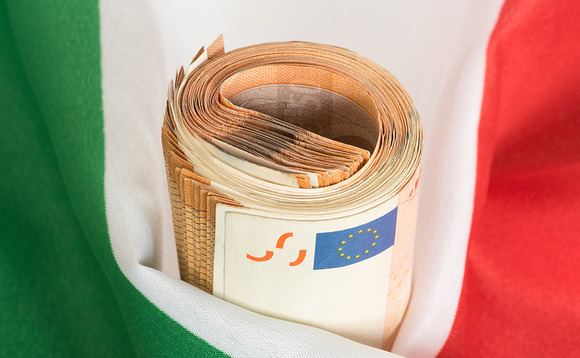
Italian funds find new source of capital

As banks continue their retreat from the private equity market, local private pension funds are hiking their PE allocations, improving fundraising prospects in Italy's mid-market. Chris Papadopoullos reports
A new wave of capital pouring in from Italy's local pension funds is set to boost the country's fundraising. Traditionally focused on fixed income, domestic pension pots are now lifting allocations to alternatives, helping to fill the gap in private equity funding left by Italy's struggling banks. Appetite from international LPs is also climbing, as poor performance among key GPs prior to, and during, the financial crisis fades from memory.
Banks were once cornerstone investors in Italian private equity, either making commitments or investing locally with their own operations. Michele Semenzato, a partner at Wise SGR, says banks' involvement is very different from the 2000s: "Now, with capital requirements and balance sheet repair, they are investing less."
Wise closed its fourth fund in 2016. In contrast to its first and second fund, little capital was raised from banks, but it did see new interest from the country's local private pension funds.
Local investors will most likely have to invest via funds-of-funds. They lack the resources to perform due diligence on a large number of PE funds" – Stefan Russo, Green Arrow Capital
As well as fewer commitments, banks have also been spinning off their in-house private equity operations; Monte dei Paschi di Siena sold its venture arm to Coller Capital in 2014. It was followed shortly by Intesa Sanpaolo, which sold its private equity portfolio to Neuberger Berman.
Meanwhile, the country has lacked the larger corporate pension funds of its northern neighbours. The private funds that do exist and which are moving toward private equity are pension funds for self-employed professionals such as lawyers, architects and medical professionals.
"Italian pension funds, like other southern European countries, have mostly fixed income assets," says Stefan Russo, partner at Green Arrow Capital, the alternatives fund manager that recently acquired Italian GP Quadrivio. "Now that interest rates have collapsed there's no question that these institutional investors must move toward more risk.
"Pension funds currently have around 4-5% invested in PE at best, compared with targets of 10-15%. These institutions are going to be buyers of long-term products over the next few years."
Bright future
Russo says rising allocations and the fact funds are underweight will unlock billions of euros of additional fund commitments over the next several years. Green Arrow is currently finishing off the fundraising for Quadrivio III, which is close to reaching its €250m target.
However, one barrier to greater investment from Italian pension funds will be the internal resources of funds unused to holding alternatives on their balance sheet.
"Local investors will most likely have to invest via funds-of-funds," says Russo. "They lack the resources and know-how to perform due diligence on a large number of private equity funds."
This could be a role for Fondo Italiano, the state-backed fund manager. Most of the new interest in private equity has come from private pension funds, with public sector funds still committed to their traditional asset classes. Says Semenzato: "Fondo Italiano helped people during the crisis – going forward it should focus on getting public sector pension funds into the asset class."
Foreign backers
The Italian mid-market is also an attractive proposition for international investors. A glut of entrepreneurs looking for investment – either because of succession issues or the need for a strategic partner – has helped to keep a lid on pricing. Entry multiples for lower-mid-market deals are around 5-7x EBITDA.
This has helped garner interest from international funds-of-funds, which are returning to investment levels seen in the early 2000s. "At that time there was quite a strong appetite for Italy," says Etienne Deshormes, founder of Elm Capital. "The private equity market was developing and the returns being generated by the pioneers of the market were quite good. But many of these early investors became a bit too greedy and raised funds that were too big for the market.
"People got hurt on the way – especially with Investitori Associati and BS Private Equity. That put a mark on Italian private equity. Today, the market is getting back to the levels it was at 10 years ago, the bad memories are fading away and we see renewed appetite for the Italian market."
Elm is currently the placement agent for Gradiente II. A majority of its commitments are expected to be from international investors. By contrast, Gradiente I, which closed in 2012, was raised domestically.
"International LPs are showing more interest in Italian GPs but only the ones who can show scale and momentum in their fundraises and those that have attracted international investors in the past," says Sunaina Sinha, founder of placement agent Cebile Capital.
"In the mid-market, GPs like Progressio and Mandarin are gaining traction. International LPs are particularly drawn to GPs that can show a differentiated strategy and scale. QuattroR, a first-time fund focused on special situations in Italy, has attracted €711m and is well on its way to its €1bn target. Such scalable strategies are particularly attractive to larger LPs like pension plans and foundations."
International LPs investing in mid-market funds will normally be funds-of-funds and family offices. The larger international pension funds are at a size mismatch with the mid-market, where equity tickets are typically €20-40m and funds are between €100-300m. "There are not so many large international pension funds [committing to Italian funds]," says Semenzato. "The Italian mid-market can't accommodate such large commitments."
Larger buyout funds have been raised in the Italian market, but have generally struggled to deploy. Those that are raised will broaden their remit across southern Europe or other areas of the continent.
Latest News
Stonehage Fleming raises USD 130m for largest fund to date, eyes 2024 programme
Sponsor acquired the public software group in July 2017 via the same-year vintage Partners Group Global Value 2017
Stonehage Fleming raises USD 130m for largest fund to date, eyes 2024 programme
Czech Republic-headquartered family office is targeting DACH and CEE region deals
Stonehage Fleming raises USD 130m for largest fund to date, eyes 2024 programme
Ex-Rocket Internet leader Bettina Curtze joins Swiss VC firm as partner and CFO
Stonehage Fleming raises USD 130m for largest fund to date, eyes 2024 programme
Estonia-registered VC could bolster LP base with fresh capital from funds-of-funds or pension funds









